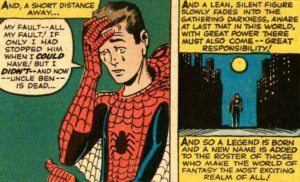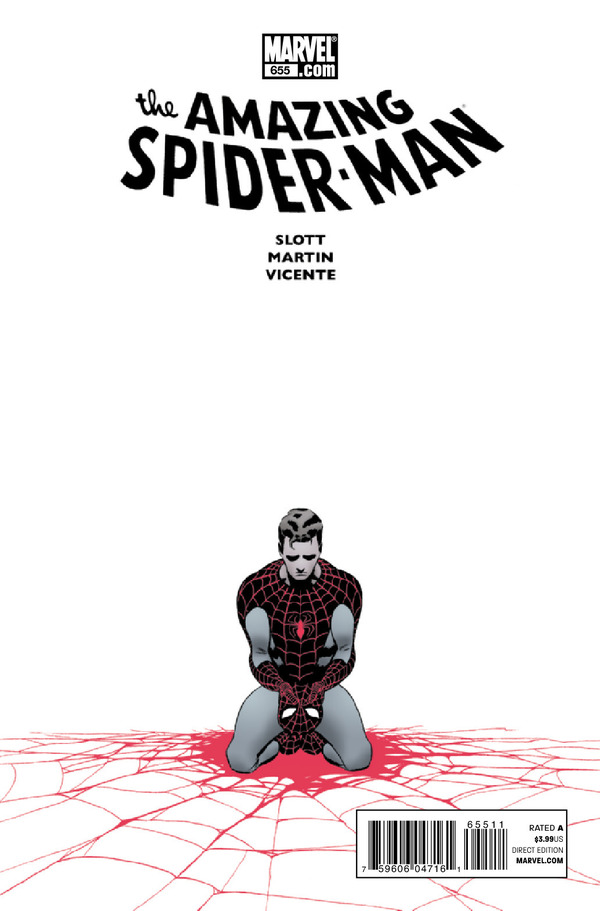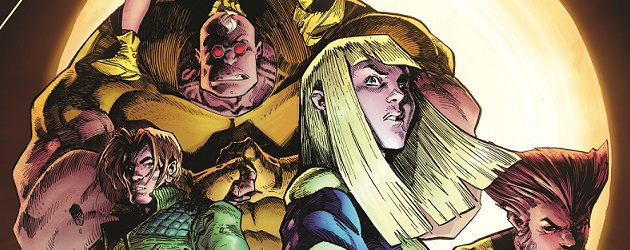Welcome to Comics Are My Religion, a look at theology through the lens of comic books. There are some basic ground rules about engaging in respectful dialog about religion in this column. Be warned, if you haven’t read the comics discussed below, you might want to go read it and come back, as this column may contain spoilers!
Everyone loves Spider-Man. Well, I’m sure most of you do. Perhaps the reason Spider-Man is such a popular character is because of the reader’s ability to relate to him. We have all experienced juggling too many jobs, or not having enough money to pay for things, or relationship issues. Or maybe we’ve been trashed publicly by someone when we know that we were in the right. When we see Spidey struggling to do these things on top of saving the world, it provides a connecting point to each of us and we immediately know what it must feel like to have the weight of the world on our shoulders.
 Maybe another reason we connect with Spider-Man is because of Peter Parker’s constant internalization of the mistakes he’s made. From the very first appearance of Spider-Man in Amazing Fantasy #15, we are introduced to the intense guilt that Peter experiences as a result of his powers. His very origin is riddled with guilt. When Peter decides to use his powers for his own gain rather than stopping a common thug, that thug ends up killing Peter’s Uncle Ben and teaches Peter the important lesson of “with great power comes great responsibility.” In fact, it’s guilt that fuels that cliché fanboy truism. And whenever Peter begins to forget that core mission statement, people start dying around him and forcing him to internalize even more guilt. It’s happened with Uncle Ben, it happened with Gwen Stacy, and most recently, it happened with Marla Jameson.
Maybe another reason we connect with Spider-Man is because of Peter Parker’s constant internalization of the mistakes he’s made. From the very first appearance of Spider-Man in Amazing Fantasy #15, we are introduced to the intense guilt that Peter experiences as a result of his powers. His very origin is riddled with guilt. When Peter decides to use his powers for his own gain rather than stopping a common thug, that thug ends up killing Peter’s Uncle Ben and teaches Peter the important lesson of “with great power comes great responsibility.” In fact, it’s guilt that fuels that cliché fanboy truism. And whenever Peter begins to forget that core mission statement, people start dying around him and forcing him to internalize even more guilt. It’s happened with Uncle Ben, it happened with Gwen Stacy, and most recently, it happened with Marla Jameson.
 In Amazing Spider-Man #654, Marla leaps in front of her husband J. Jonah Jameson, who is being attacked by the Spider-Slayer. Marla catches a blade in the chest, and Jonah is left holding her as she dies. However, not only is Jonah devastated, but Peter once again internalizes the guilt of not being more powerful, faster, or more in control of the situation. And yet another person dies on his watch. In issue #655, we see the funeral of Marla Jameson and how it’s affecting Jonah and Peter. In the silent portion of the issue, Peter debates on whether or not to wear his costume under his suit, and opts not to do so. Jonah remains stoic and stone-faced throughout the entire issue, and you just know he’s being eaten alive by guilt. See, the Spider-Slayer may have killed Marla, but it was in revenge against something that Jonah had done. Perhaps if Jonah were kinder, more compassionate, or more loving, his wife would not have died. Later in the issue, Peter has a dream where he is confronted by literally every person who has died on his watch. Even after all these years, Peter still carries the burden of guilt that he didn’t use his powers responsibly enough to save them.
In Amazing Spider-Man #654, Marla leaps in front of her husband J. Jonah Jameson, who is being attacked by the Spider-Slayer. Marla catches a blade in the chest, and Jonah is left holding her as she dies. However, not only is Jonah devastated, but Peter once again internalizes the guilt of not being more powerful, faster, or more in control of the situation. And yet another person dies on his watch. In issue #655, we see the funeral of Marla Jameson and how it’s affecting Jonah and Peter. In the silent portion of the issue, Peter debates on whether or not to wear his costume under his suit, and opts not to do so. Jonah remains stoic and stone-faced throughout the entire issue, and you just know he’s being eaten alive by guilt. See, the Spider-Slayer may have killed Marla, but it was in revenge against something that Jonah had done. Perhaps if Jonah were kinder, more compassionate, or more loving, his wife would not have died. Later in the issue, Peter has a dream where he is confronted by literally every person who has died on his watch. Even after all these years, Peter still carries the burden of guilt that he didn’t use his powers responsibly enough to save them.
What’s most troubling about Peter’s situation is that he is the primary guilt-bearer on himself. Aunt May isn’t wagging her finger at Peter for what happened to Uncle Ben. Mary Jane doesn’t nag Peter for the lives lost by the super-villains Spider-Man fights. All of that guilt is heaped on by no one but himself.
But isn’t that how we all tend to be? We are sometimes much harder on ourselves than others are on us. The guilt we tend to consume is almost overwhelming. If only we had made a different choice, or had been better, or more powerful, then perhaps the bad things in our lives wouldn’t occur. Or maybe we have those people in our lives who do remind us constantly of the guilt and shame we carry, which only impacts it even more.
 Religion, in my view, is supposed to free us from guilt. However, it’s been my experience of listening to people who have found religion to be more of a guilt-maker than a guilt-taker. Especially in Christianity, which is the perspective with which I’m most familiar. No branch of Christianity is free from producing guilt, but I tend to hear more struggles from my Catholic and fundamentalist Christian friends. In fact, guilt is what tends to send more people screaming from organized religion than towards it.
Religion, in my view, is supposed to free us from guilt. However, it’s been my experience of listening to people who have found religion to be more of a guilt-maker than a guilt-taker. Especially in Christianity, which is the perspective with which I’m most familiar. No branch of Christianity is free from producing guilt, but I tend to hear more struggles from my Catholic and fundamentalist Christian friends. In fact, guilt is what tends to send more people screaming from organized religion than towards it.
This week is the first week of Lent in many Christian traditions. Lent has typically had a dark shadow cast on it because it’s the time when Christians focus more on sin and penitence as we prepare for the grace of Easter that is to come. One tradition that we practice in the Episcopal Church is disciplines of giving up something or taking on something. Many Christians stress out about this tradition, and tend to beat themselves up if they don’t stick to their discipline. This is an example of the larger abuse we give ourselves involving sin. We are the harshest critics, burying our own mistakes and shame within ourselves. We tend not to share these darkest parts of ourselves, and much like Peter Parker, internalize to the point of serious damage to who we are. Consider the person who has made bad financial decisions, but continues to run up their credit card in order to cover up their mistakes, incurring even more debt, so that other people won’t know they are really suffering. Our guilt ends up leading us to more bad choices which only further our guilt. It’s an endless cycle.
 But religion is intended to free us from guilt. We are called to be in a state of peace and love, which frees us from the years of abuse we heap on ourselves. Religion is never intended to cause more harm, even though it often does. Going back to Lent, the word Lent means “spring.” (Lots of folks think Lent means “sin.”) Like spring cleaning for our houses, it’s the time where were do some self-examination, look objectively at ourselves, and draw closer to our Creator. It’s a fresh start intended to teach us about grace, not guilt.
But religion is intended to free us from guilt. We are called to be in a state of peace and love, which frees us from the years of abuse we heap on ourselves. Religion is never intended to cause more harm, even though it often does. Going back to Lent, the word Lent means “spring.” (Lots of folks think Lent means “sin.”) Like spring cleaning for our houses, it’s the time where were do some self-examination, look objectively at ourselves, and draw closer to our Creator. It’s a fresh start intended to teach us about grace, not guilt.
I wish I was more familiar with other religions to share how they deal with guilt, shame, and grace. Perhaps you could shed some light on this by commenting below and teaching us about what you know of your faith tradition or other religions.
Perhaps we are a lot like Peter Parker, continuously going over in our minds how we should have done better with the gifts we’ve been given. Maybe we can allow ourselves a moment to imagine the possibility that not everything is our fault, that just because we all have great power, doesn’t mean we have all the responsibility. Some things we just can’t help no matter how hard we try. So let yourself off the hook. Talk to a friend, or some other non-judgmental person who can remind you that you don’t need to heap guilt onto yourself. Maybe we can find peace within ourselves for the wrongs we’ve done and move forward, cleaning the guilt out of our lives, and making a fresh start.
To read previous editions of Comics Are My Religion, click here!
Editor’s Note: ComicAttack.net has been officially nominated for an Eagle Award! Please click here to vote for us in the “Favorite Comic Book Website” category (question #27). Thank you for your continued support!
Jeff Jackson
jeff@comicattack.net





I’ve always hated the idea that people should be guilted into religion or faith, but I know there are churches that practice this. I think that’s an awful way to base your faith. It’s about grace and forgiveness, not about how bad you should feel. I was lucky enough to grow up in a church that didn’t play the guilt card,
I want to believe that no church uses guilt intentionally, but I know that’s probably not accurate. Guilt is an easy way to get people to do and believe what you want, but ultimately, it’s most damaging and least loving thing you can do. It’s good to hear, Kristin, that you didn’t have an experience of guilt in your church.
Yeah, it’s a good thing, too, because I’m the kind of person that can really dwell on guilt and become very self loathing. I’m happy to say I had a very pleasant experience overall in my church growing up. Lots of loving people there, and no politics.
Really great post, Jeff. Good job!
Very great insight Jeff it just seems as if Peter never has anyone to speak to nor does he ever seem to get over any of his mistakes. I guess that’s just how the writers want to keep him.
Guilt is a beast of an emotion whether you believe an any type of God or not and if not dealt with in a positive way you’ll never recover and be whole.
Nice article. Guilt is something that is central to Peter, and that may be why I don’t read much of his books. A little guilt is fine, but it seems like he feels guilty for everything under the sun.
Yeah, Peter does a good job of beating himself up. Especially since this issue, with his whole “no one dies on my watch” mantra.